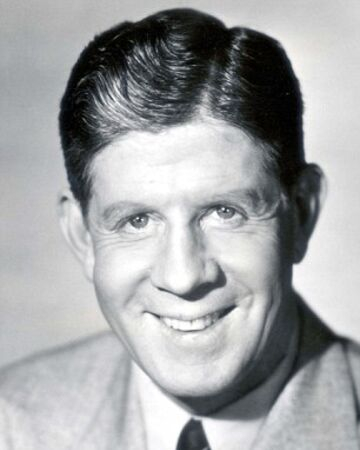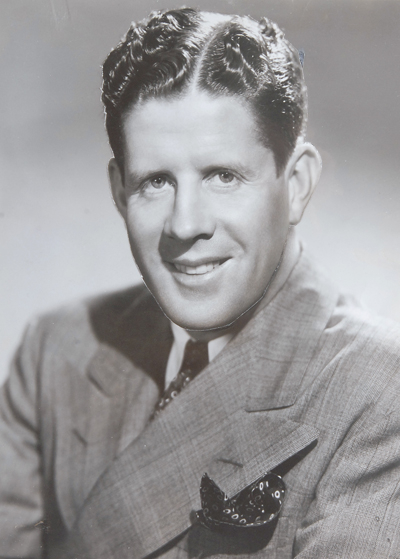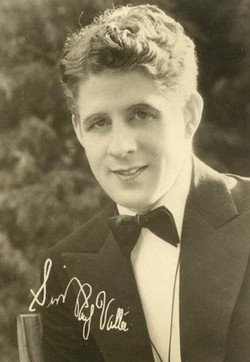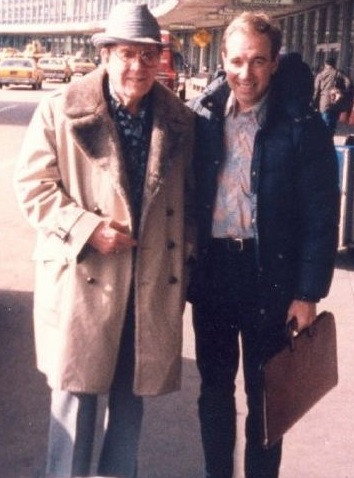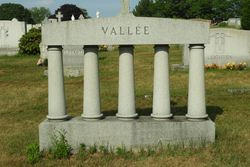Rudy Vallee, whose twangy crooning style, aided by a handheld megaphone, made him a singing idol of the 1930's and 40's, died Thursday night at his home in North Hollywood, Calif. He was 84 years old.
Mr. Vallee, whose most famous radio and stage theme songs were ''My Time Is Your Time'' and ''The Whiffenpoof Song,'' underwent surgery for throat cancer in March, and while in Cedars-Sinai Medical Center suffered a stroke that prolonged his hospital stay for several weeks.
He apparently suffered a heart attack while watching the Statue of Liberty ceremonies on television, a spokesman for the North Hollywood police said.
He had been living in comfortable retirement for several years, but occasionally made public appearances that recalled his heyday as a wildly popular entertainer.
'Heigh-Ho, Everybody!'
From 1928 through the late 30's, the insouciant salutation ''Heigh-ho, everybody!'' introduced Mr. Vallee to radio, theater and nightclub audiences.
A vocalist and saxophone player adored by millions of Americans, most of them women, he was a tall, blue-eyed, fresh-faced, curly-haired Yale graduate whose eager listeners took the song ''My Time Is Your Time'' so to heart that thousands of them clamored for the tiniest details of his private life and stampeded in the streets to hear and touch him.
A legend in his own time, akin to Frank Sinatra in a later era, ''the Vagabond Lover,'' as he was known, excited passions. A Harvard critic flung a grapefruit at him; a woman in the Middle West shot her husband dead because he interrupted a Vallee broadcast by demanding, ''Why don't you get something worth listening to?''
Thursday evenings, when Mr. Vallee and his Connecticut Yankees dance band appeared on radio, were a sacrosanct time across the nation. Women swooned and teen-agers shrieked when he played and sang such tunes as ''The Maine Stein Song,'' ''Cheerful Little Earful,'' ''If I Had a Talking Picture of You'' and ''Say It Isn't So.'' 'Vagabond Lover'
Hardly an appearance in those years took place without Mr. Vallee's singing ''I'm Just a Vagabond Lover,'' the chorus of which became imprinted on the brains of millions. It ran:
For I'm just a vagabond lover, In search of a sweetheart it seems, And I know that someday I'll discover her, The girl of my vagabond dreams.
Apart from his saxophone, on which he was genuinely talented, Mr. Vallee possessed few musical qualities.
''I never had much of a voice, and it was all in my nose,'' he once confessed. ''But I think one reason for the success was that I was the first articulate singer - people could understand the words I sang. And at least I had pitch.''
The personality he established for himself survived a long ebb in his fame, making it possible for him to enjoy a revival in the 1960's as a stage and film actor in the role of J. B. Biggley, the wicket tycoon, in ''How to Succeed in Business Without Really Trying.'' Cupping his hands to simulate the megaphone he had once employed, he was a hit singing ''Grand Old Ivy'' and ''Love From a Heart of Gold.'' Lived Modestly
Mr. Vallee earned a great deal of money, and parted with as little of it as possible. He kept his tips extremely modest, avoided expensive clothes, rarely spent more than a nickel for cigars and often ate in the Automat or other inexpensive restaurants.
Mr. Vallee's life exemplified the rise, if not from rags, at least from small-town obscurity to riches. He was named Hubert Prior Vallee at birth on July 28, 1901, in Island Pond, Vt. The son of a pharmacist who soon moved to Westbrook, Me., he attended high school, played drums and set up pins in a bowling alley.
After a dispute with his father, the young man got a $7-a-week job as an assistant to the projectionist in the local movie house. He also began a serious study of the clarinet, shifting later to the saxophone. Using the recordings of Rudy Wiedoeft, a well-known saxophonist, Mr. Vallee taught himself to play the instrument and, out of respect for Mr. Wiedoeft, took his first name.
With his saxophone under his arm, he entered the University of Maine in the fall of 1921, playing at dances to pay his way. He switched to Yale after a year, and continued to play freelance in bands for two years. Then he went off to London for a year to play with a band at the Savoy Hotel.
It was there that he purchased his future signature song, ''My Time Is Your Time.'' He also acquired a hint of Continental suavity, which he brought back to Yale and his band dates. He took a bachelor's degree in philosophy in 1927 and developed, meanwhile, a mellow saxophone style.
After knocking around with various society orchestras, Mr. Vallee formed his Connecticut Yankees and opened at the Heigh Ho Club in New York in January 1928. The club was the inspiration for his ''heigh-ho'' greeting as well as for his singing through a megaphone to amplify his voice.
Mr. Vallee began his radio career in February 1928, when WABC picked up his music from the Heigh Ho Club. He was an immediate hit, and soon he was broadcasting 25 times a week over various stations. There followed theater and vaudeville engagements and a trip to Hollywood with the band to make ''The Vagabond Lover'' for RKO.
In the fall of 1929, Mr. Vallee and his band opened a series of Thursday-evening broadcasts, which lasted 10 years, designed to popularize Fleischmann's Yeast. At first the crooner and his 16-piece orchestra dominated the show, but listener boredom set in and the format was changed to that of a variety show. It presented such personalities as Joe Penner, Kate Smith, George Burns and Gracie Allen, Eddie Cantor, Red Skelton, Bob Hope, Fanny Brice, Victor Borge and Larry Adler.
Mr. Vallee played and sang at other engagements across the country and at the Villa Vallee (now the Copacabana Club) at 10 East 60th Street. His tours alone in those years grossed $18,000 to $20,000 a week.
He also appeared in the 1931 and 1936 stage versions of George White's ''Scandals,'' and he made movies, conceivably among the least satisfactory ever produced in Hollywood. Among them were ''Sweet Music,'' ''Gold Diggers of Paris,'' ''Second Fiddle'' and ''The Palm Beach Story.'' Only in the last-named was he fairly memorable, although his reviews were quite good in ''How to Succeed'' in the 60's. Served in the Coast Guard
He left radio to join the Coast Guard in World War II and to conduct the 11th Naval District Coast Guard Band. He returned to commercial radio in 1944 and also appeared in movies and club dates.
Although Mr. Vallee was not a modest man, as his 1962 autobiography ''My Time Is Your Time'' indicated, he was hard-working to the point of indefatigability, and his show-business reputation was good.
With the advent of television of the 1950's, Mr. Vallee decided that the medium was not for his message, so he spent most of the decade playing club dates and acting in stock. He kept his name before the public, however, and this permitted him to be considered for ''How to Succeed,'' the vehicle of his later renown. The show enjoyed a long Broadway run, with audiences coming to see and hear an older Mr. Vallee who had retained many traces of his youthful freshness.
''I've come a long way from Vermont and Maine on a highway paved, for the most part, with good fortune,'' he said in his later years. ''Except for a few harrowing detours, it has been a ball; I venture to say that a lot of my fans have shared the fun with me.''
Mr. Vallee was married four times -to Leonie Cauchois, Fay Webb, Bettyjane Greer and Eleanor Norris. He had no children.
ADVERTISEMENT
BY
Looking for more information?
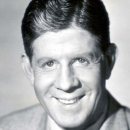
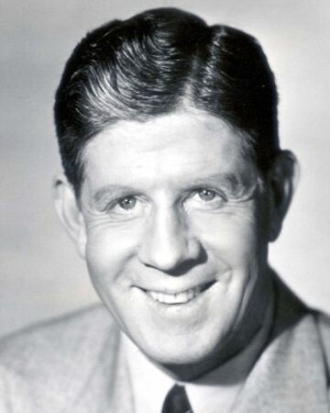
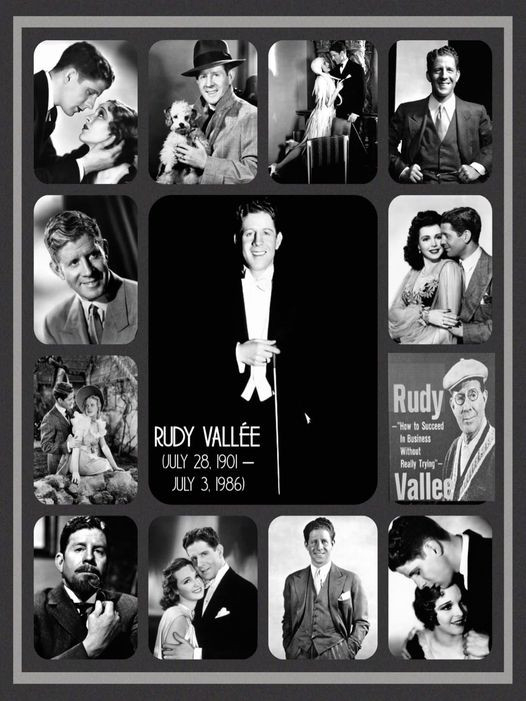
 Amanda S. Stevenson
Amanda S. Stevenson 